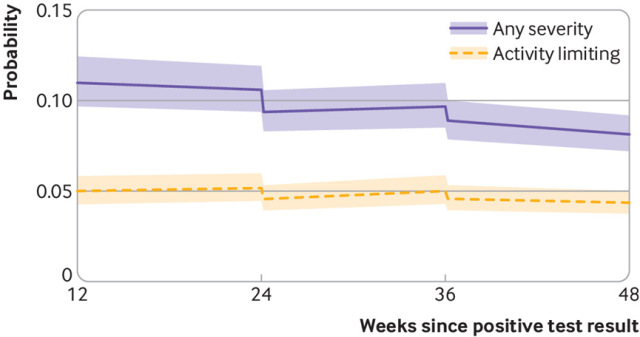BMJ: Vaccination after infection reduces the incidence of COVID-19 sequelae by 8.8%
- Normal Liver Cells Found to Promote Cancer Metastasis to the Liver
- Nearly 80% Complete Remission: Breakthrough in ADC Anti-Tumor Treatment
- Vaccination Against Common Diseases May Prevent Dementia!
- New Alzheimer’s Disease (AD) Diagnosis and Staging Criteria
- Breakthrough in Alzheimer’s Disease: New Nasal Spray Halts Cognitive Decline by Targeting Toxic Protein
- Can the Tap Water at the Paris Olympics be Drunk Directly?
BMJ: Vaccination after infection reduces the incidence of COVID-19 sequelae by 8.8%
- Should China be held legally responsible for the US’s $18 trillion COVID losses?
- CT Radiation Exposure Linked to Blood Cancer in Children and Adolescents
- FDA has mandated a top-level black box warning for all marketed CAR-T therapies
- Can people with high blood pressure eat peanuts?
- What is the difference between dopamine and dobutamine?
- How long can the patient live after heart stent surgery?
BMJ: Vaccination after infection reduces the incidence of COVID-19 sequelae by 8.8%.
Regarding the sequelae of the COVID-19, The Lancet Respiratory Medicine once published a study that mentioned that the occurrence of breakthrough infection after vaccination will reduce the incidence of COVID-19 sequelae by 50%.
On May 18, BMJ published a large-scale cohort study paper by the Office for National Statistics in the United Kingdom.
The results showed that vaccine supplementation after infection with the virus can steadily reduce the incidence of COVID-19 sequelae by 8.8%.
On May 16, the “Chinese Center for Disease Control and Prevention Weekly Report (English)” reported the first imported case in some countries who was confirmed to be infected with the new coronavirus Omicron subtype strain BA.2.12.1. The new coronavirus is still mutating, and it is currently impossible to accurately predict its pathogenicity and transmissibility.
Although now, under the combined effect of the COVID-19 vaccine and the general enhancement of natural immunity, and the introduction of new drugs and treatments, the severity and mortality of the COVID-19 have dropped significantly.
But we have to pay attention to the sequelae of the COVID-19. Previously, we wrote an article to systematically sort out the possible sequelae after infection with the new coronavirus.
Recently, in a study titled “Trajectory of long covid symptoms after covid-19 vaccination: community based cohort study” published in the British Medical Journal (BMJ), the researchers found through data analysis that people were vaccinated after being infected with the new coronavirus. With the COVID-19 vaccine, the probability of patients suffering from COVID-19 sequelae has been steadily reduced by 8.8%, and their COVID-19 sequelae will continue to improve after the second dose of vaccine.

Figure 1 Research results (Source: BMJ)
For the study, the Office for National Statistics surveyed data from a total of 28,356 participants.
Participants were, on average, 46 years old and had received at least one dose of adenoviral vector vaccine or mRNA vaccine after being infected with the new coronavirus.
23.7% of the patients in this cohort suffered from COVID-19 sequelae, according to the definition of “COVID-19 sequelae” if symptoms persisted 12 weeks after infection.
Before the vaccination, the sequelae of the COVID-19 of these patients did not improve significantly over time.
After the first vaccination, the incidence of the COVID-19 sequelae was reduced by 12.8%, but the long-term effect was not stable.
After the second dose of the COVID-19 vaccine, the incidence of COVID-19 sequelae can be reduced by 8.8%, and the long-term effect is stable.

Figure 2 Estimated time trajectory of COVID-19 sequelae caused by 2019-nCoV infection, and changes in this trajectory after vaccination (Source: BMJ)
In this study, the researchers have not found data on the difference in the incidence of COVID-19 sequelae after vaccination among participants vaccinated with adenovirus vector vaccine and mRNA vaccine.
Analyzing the individual symptoms of some patients, the researchers found that after vaccination, the chances of those infected with more than three or five symptoms dropped significantly.
And the probability of COVID-19 sequelae usually increases between the first dose of vaccine and the second dose of vaccine, the decline resumed after the second dose of the vaccine and gradually stabilized.
To sum up, in this study, after the first dose of the vaccine, the probability of COVID-19 sequelae decreased by nearly 13% on average, and after the second dose of the vaccine, this number remained stable at 8.8%, which is not the same as Follow-up studies of critically ill patients with COVID-19 have also confirmed this.
As a result, the researchers say that vaccinating people who have been infected with the new coronavirus, at least in the first few months of vaccination, may be strongly associated with reducing the sequelae of the COVID-19.
It should be noted that this is only an observational follow-up study. Further research is needed to evaluate the relationship between vaccination and the sequelae of the COVID-19 virus.
At the same time, it is necessary to take into account the constantly mutating new coronavirus and the risk of multiple infections with the new coronavirus. Influence.
References:
[1] Ayoubkhani D, Bermingham C, Pouwels KB, et al. Trajectory of long covid symptoms after covid-19 vaccination: community based cohort study. BMJ. 2022 May 18;377:e069676. doi: 10.1136/bmj-2021-069676 .PMID: 35584816.
BMJ: Vaccination after infection reduces the incidence of COVID-19 sequelae by 8.8%
(source:internet, reference only)
Disclaimer of medicaltrend.org
Important Note: The information provided is for informational purposes only and should not be considered as medical advice.



